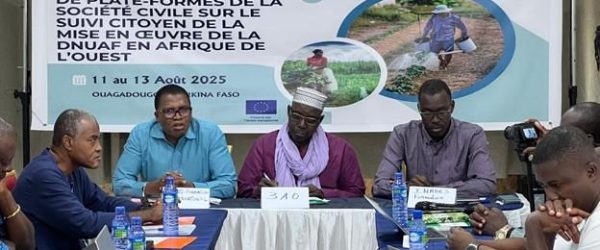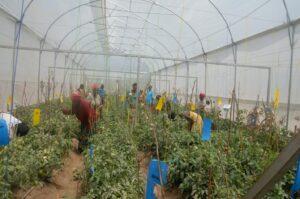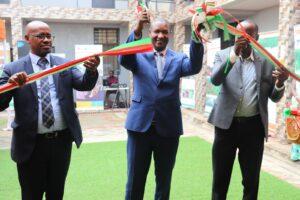Ouagadougou, August 11-13, 2025 – As part of the ACRE project (“Strengthening CSO action in the development of policy frameworks for equitable rural development and increased contribution of family farmers to the achievement of the SDGs”), co-funded by the European Union and implemented by INADES-Formation and the World Rural Forum, a regional workshop brought together West African national civil society platforms to take stock of the implementation of the United Nations Decade for Family Farming (UNDAF).
For three days, representatives from Benin, Côte d’Ivoire, Togo, Burkina Faso and Mali shared their experiences, discussed the challenges they faced and formulated strategies to boost citizen action in favor of family farming, an essential pillar of food security and sovereignty in the region.
Rich exchanges and national advances
Papers, round tables and group work provided an opportunity to take stock of national processes for drawing up National Action Plans (NAPs ), and to discuss the need to strengthen regional coordination.
- In Togo, the Comité National de l’Agriculture Familiale (CNAF) presented an inclusive process that led to the adoption of a NAP validated in 2021, incorporating major reforms such as the acceleration of the land code.
- In Côte d’Ivoire, the process launched in 2021 is progressing, with the setting up of a steering committee and the preparation of a draft NAP. The major challenge remains its official adoption by the authorities.
- In Burkina Faso, stakeholders, including INADES-Formation Burkina, have contributed to the development of a national roadmap, despite slow institutional progress. The outlook is for the establishment of a national coordinating committee and greater mobilization of partners.
Citizen monitoring, a lever for public action
A key communication focused on the importance of citizen monitoring in the implementation of development policies. Transparency, accountability and the active participation of farmers’ organizations were identified as essential conditions for advancing family farming. Participants proposed concrete mechanisms, such as citizen observatories, community scorecards and multi-stakeholder frameworks, to reinforce the impact of actions taken.
Recommendations for the future
The workshop highlighted several strategic recommendations:
- Guarantee the effective participation of farmers in all stages of UNDAF implementation.
- Strengthen technical and financial support from international organizations such as the FAO and IFAD.
- Promoting agro-ecology and sustainable practices as central levers for food sovereignty.
- Increase media coverage and dissemination of success stories to inspire other countries.
A decisive step for the region
In closing the workshop, the Secretary General of INADES-Formation, Mr Sena ADESSOU, praised the progress made by the national platforms and encouraged those still struggling to make the most of these shared experiences. He insisted on the need to consolidate regional dynamics in order to make UNDAF a real engine of transformation for family farming in West Africa.
This workshop confirms the commitment of INADES-Formation and its partners to supporting family farming, the foundation of climate resilience, social justice and food sovereignty in the region.











